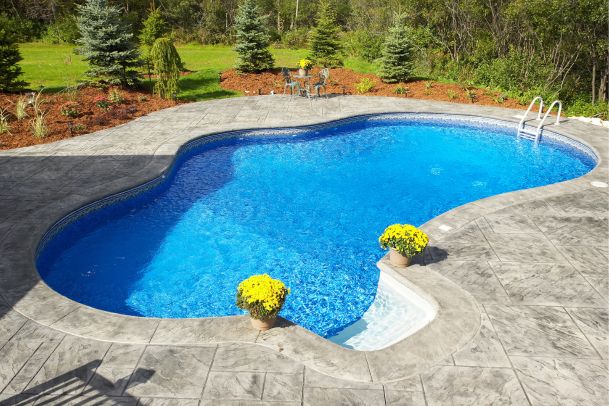
Written by Kayla Jane Barrie Updated on Aug 11, 2025 6 mins read

There is nothing like a dip in the pool on a hot summer day. It is a great place to spend time with family and friends. Are you thinking about installing a pool? Or considering buying a home with one? It's important to know how a swimming pool affects home insurance.
Pools are a liability. There is the potential for slips and falls on wet surfaces and drowning, so pool insurance is crucial. Ready to take the plunge and invest in a pool? Here is how you can protect it, and your family, and have a safe summer.
Data from the Government of Canada reveals that between April 1, 2011, and April 13, 2023, 1,109 drowning incidents were reported, with 56% occurring in residential or public swimming pools. This highlights the heightened risk of accidents and drownings associated with backyard pools.
In Canada, homeowners can be held liable for deaths and injuries on their property, including their pools, even if the individual was trespassing. This substantial personal liability risk underscores the critical need for adequate insurance coverage and adherence to municipal pool ownership regulations.
While homeowner's insurance can offer support in pool-related lawsuits, it's crucial to follow all required safety precautions. Failure to do so could invalidate your policy, leaving you personally responsible for damages.
The insurance costs for your pool can vary depending on its size, type, and value. Additionally, limits can also affect how much you pay. As a general rule of thumb, you can pay around $25-$75 more per month to insure a pool. But, get a quote to know how much a pool will affect your policy.
There are two main ways a pool affects it:
These factors will have an impact on your costs and plan limits. Installing a pool increases the value of your property. You must increase your limits to ensure they align with your home replacement value.
It is important to remember that whether you are installing or purchasing a home with a pool will impact your costs. This applies to all types of pools, including above-ground, in-ground, and in-ground pools. It is your responsibility to ensure the safety of those who use it.
Although swimming pools provide many benefits, they require careful consideration before investing in them. Installing a pool can be a significant expense, with an average cost ranging from $25,000 to $100,000 or even more, depending on the size and type. Additionally, there are annual maintenance fees to consider. According to Statistics Canada, a record 11,168 permits were issued nationwide for the residential construction of inground swimming pools in the second quarter of 2021.
All properties are unique. Having the proper protection for your property is essential to minimize risk factors. When you have a pool, ensuring you have enough coverage is critical. You must protect yourself from liability claims and ensure it is covered if damaged. Here are some options to consider:
Speak with your insurer to assess your needs.
Municipalities set specific requirements – check your local area for specific requirements. Ontario home insurance requires all homeowners to follow these rules as a condition of their agreement. You will need a fence enclosing the pool, the proper permits from your municipality, and the ability to meet other land grading and zoning criteria. Here are some areas to get started with:
It is important to remember that gate requirements, height specifications, and pool material regulations may differ depending on location. Not following these regulations can lead to fines, legal liability, and harm. Therefore, checking with your local government and insurer is always recommended to ensure you take the necessary steps to keep everyone safe.
It is crucial to inform your insurance broker if you have a pool on your property so they can provide you with the proper swimming pool liability insurance coverage limits to adequately address the increased risk exposure. If someone gets injured and sues you, your claim will get denied if you fail to inform your insurer about your pool. You may face challenges getting coverage in the future.
Whether insurance covers pool damage depends on the specific circumstances, the type of insurance policy you have, and the cause of the damage. Here are some common scenarios:
If a severe storm with strong winds causes a tree to fall onto your pool and damages its structure and equipment, your homeowner's insurance policy will likely cover the damage. Most homeowner's insurance policies usually consider falling trees a covered peril. Your policy should cover repairing or replacing the damaged pool structure and equipment, subject to policy limits and deductibles.
Over time, the lining of your pool can deteriorate due to lack of maintenance, which can cause cracks, leaks, and other structural damage. Unfortunately, in this scenario, your homeowner's insurance policy is unlikely to cover the damage to your pool. Damage caused by lack of maintenance or normal wear and tear is typically excluded from coverage. Since the damage is a result of neglect rather than a sudden and unexpected event, you will likely be responsible for repairing or replacing the pool out of pocket.
It is crucial to carefully review your policy to comprehend what is covered and what is not concerning your swimming pool. If you have any particular concerns about your coverage, seek guidance from your broker to clarify the matter.

You may be surprised to hear that depending on the type of pool you have can impact the type of pool insurance you need.
It's important to note that different municipalities may have specific requirements that an insurance company needs to satisfy before approving your coverage. For instance, your insurance application may be rejected if you don't have a fence that can secure your pool from unsupervised public use.
You need to take steps to reduce risk if you have a pool on your property. Here are some ways to do this:
Yes. Insurers recommend you increase your Ontario home insurance limits to cover the additional risk and increased value of your property.
When insuring your pool for an Airbnb, you need to make sure the entire property and building are covered with homesharing insurance. Let your provider know about the pool and additional safety precautions you have.
It depends on your insurer and the type of policy. It can also depend on your pool type, your water damage insurance, and other factors. Check your documents to confirm if structural collapse is included. Consider the cost of rebuilding the pool and repair any damages from the incident.
Pool leaks are generally not covered, depending on the circumstance. Generally, they are normal wear and tear and will not be covered under most home insurance plans. But, if a leak is caused by damage from a tree or storm, you could be covered depending on your protection plan.
Yes - even if you are renting a home, you should declare there is a pool. There are additional tenant insurance options for long and short-term protection.
| Categories | Home |
|---|---|
| Tags | Protect Your HomeSeasonal Home |
Read our insurance blog to get helpful tips, information and news.
Find out if a seatbelt ticket will raise your car insurance rates and how insurers view seatbelt violations.
Ontario’s Project CHICKADEE dismantled a $25 million auto theft ring. Discover how this massive bust targets export enablers and what it means for rising Canadian insurance premiums.
Think refusing a breath test helps your case? In Ontario, it results in a minimum fine of $2,000 and a criminal record. Compare the penalties and protect your future.
Impaired driving in Ontario is a serious offence. Learn about impaired driving fines, penalties, statistics and other important information all drivers in Ontario need to be aware of before they get behind the wheel.